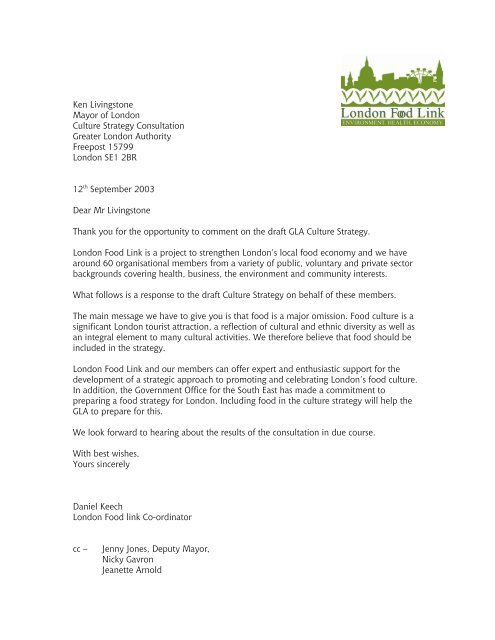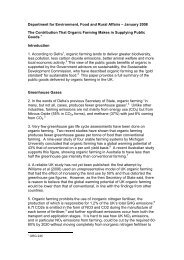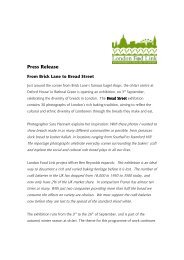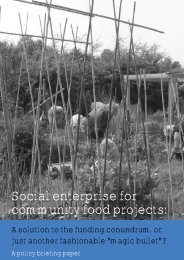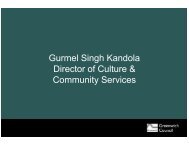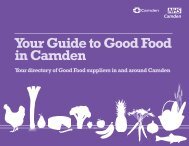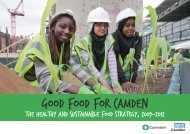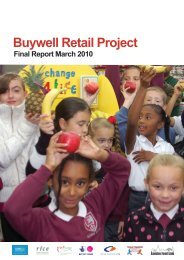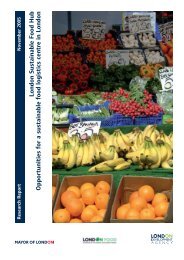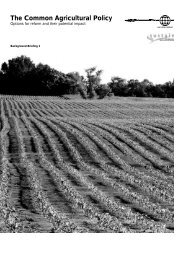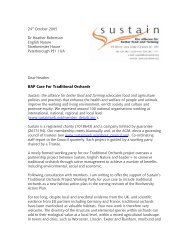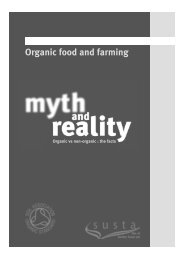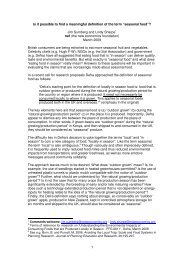Ken Livingstone Mayor of London Culture Strategy ... - Sustain
Ken Livingstone Mayor of London Culture Strategy ... - Sustain
Ken Livingstone Mayor of London Culture Strategy ... - Sustain
You also want an ePaper? Increase the reach of your titles
YUMPU automatically turns print PDFs into web optimized ePapers that Google loves.
<strong>Ken</strong> <strong>Livingstone</strong><strong>Mayor</strong> <strong>of</strong> <strong>London</strong><strong>Culture</strong> <strong>Strategy</strong> ConsultationGreater <strong>London</strong> AuthorityFreepost 15799<strong>London</strong> SE1 2BR12 th September 2003Dear Mr <strong>Livingstone</strong>Thank you for the opportunity to comment on the draft GLA <strong>Culture</strong> <strong>Strategy</strong>.<strong>London</strong> Food Link is a project to strengthen <strong>London</strong>’s local food economy and we havearound 60 organisational members from a variety <strong>of</strong> public, voluntary and private sectorbackgrounds covering health, business, the environment and community interests.What follows is a response to the draft <strong>Culture</strong> <strong>Strategy</strong> on behalf <strong>of</strong> these members.The main message we have to give you is that food is a major omission. Food culture is asignificant <strong>London</strong> tourist attraction, a reflection <strong>of</strong> cultural and ethnic diversity as well asan integral element to many cultural activities. We therefore believe that food should beincluded in the strategy.<strong>London</strong> Food Link and our members can <strong>of</strong>fer expert and enthusiastic support for thedevelopment <strong>of</strong> a strategic approach to promoting and celebrating <strong>London</strong>’s food culture.In addition, the Government Office for the South East has made a commitment topreparing a food strategy for <strong>London</strong>. Including food in the culture strategy will help theGLA to prepare for this.We look forward to hearing about the results <strong>of</strong> the consultation in due course.With best wishes,Yours sincerelyDaniel Keech<strong>London</strong> Food link Co-ordinatorcc –Jenny Jones, Deputy <strong>Mayor</strong>,Nicky GavronJeanette Arnold
1. Food <strong>Culture</strong> in <strong>London</strong>Pr<strong>of</strong>ile• <strong>London</strong>’s cosmopolitan nature is perfectly reflected in its vibrant restaurantscene, which, according to the <strong>London</strong> Tourist Board, has “become the envy<strong>of</strong> the world, <strong>of</strong>fering a diversity <strong>of</strong> food not found in any other city”. 1• There are 12,155 restaurants in <strong>London</strong> 2 (just under half <strong>of</strong> the UK’s total)<strong>of</strong>fering cuisines from around 60 different countries, 5,245 pubs and bars 3 ,and 1200 hotels, <strong>of</strong> which 300 have full restaurant facilities. 4 Eating out byvisitors to <strong>London</strong> generates £1.6 billion annually for the <strong>London</strong> economy. 5• There are around 28 farmers’ markets in <strong>London</strong>, most <strong>of</strong> which sell fooddirect from farms within 100 miles <strong>of</strong> <strong>London</strong> and which generate about £4million a year 6 .• Some 25 million people visited <strong>London</strong> in 1998, 13.5 million <strong>of</strong> whom werefrom outside the UK. Around 75% <strong>of</strong> all international visitors to the UK visit<strong>London</strong>. 7 <strong>London</strong>’s food culture will undoubtedly form part <strong>of</strong> the ‘touristpackage’, for better or worse.• <strong>London</strong>’s food industry contributes significantly to the city’s GDP andaccounts for around 11% <strong>of</strong> the total number <strong>of</strong> jobs in the capital 8 .2. Responses to the draft PoliciesPolicy 1 <strong>London</strong> needs more investment in its world-class culturalinstitutionsWe welcome the calls for strengthening <strong>London</strong>’s cultural infrastructure.We would, however, wish to emphasise that some events are driven bycelebrations <strong>of</strong> food and drink, such as Apple Day, which will take place thisyear in Trafalgar Square, the Great British Beer Festival, Food Lovers’ Fair inCovent Garden (which attracts 250,000 visitors) and <strong>London</strong> events for BritishFood Fortnight, as well as many smaller markets and food festivals.Some sports and cultural events are especially associated with food, such asWimbledon’s strawberries, West Indian food stalls at the Notting Hill Carnival,Chinese New Year buns, t<strong>of</strong>fee apples on Guy Fawkes’ night. The religious1 <strong>London</strong> Tourist Board, on website <strong>of</strong> the <strong>Mayor</strong> <strong>of</strong> <strong>London</strong>, the <strong>London</strong> Assembly and the Greater <strong>London</strong> Authority:http://www.london.gov.uk/london/ltb.jsp2 <strong>London</strong> First Centre: http://www.lfc.co.uk/about_london/facts.asp?key=44&L2=213 <strong>London</strong> First Centre: http://www.lfc.co.uk/about_london/facts.asp?key=44&L2=214 <strong>London</strong> Tourist Board, Capital Food Facts: http://www.visitlondon.com/uploads/96CapitalFoodFacts.pdf5 <strong>London</strong> Tourist Board, Capital Food Facts: http://www.visitlondon.com/uploads/96CapitalFoodFacts.pdf6 Barrett, M with Keech, D. Local Food World City (Draft), <strong>Sustain</strong>, June 2003.7 100 Facts on <strong>London</strong>. <strong>London</strong> First Centre. http://www.lfc.co.uk/about_london/facts.asp?key=44&L2=218 Garnett, G. City Harvest, <strong>Sustain</strong> 1999.
calendar is similarly punctuated by special foods including Easter eggs,Christmas pudding, matzos at Passover, Pancake Day, and Diwhali sweets.Many people eat at major cultural and sporting events. While food culture maybe reflected in the football match hot dog and the greyhound track plate <strong>of</strong> fishand chips, sporting venues could think creatively about the types <strong>of</strong> foodsprovided. There is a place for good, healthy and diverse food alongside thetraditional favourites. The <strong>Culture</strong> <strong>Strategy</strong> should not exist in isolation and mayconstitute an opportunity for using food as a conduit for implementing local 5-a-day and other healthy eating programmes (cf. strategic links in paragraph295).<strong>London</strong>’s cultural significance is partly the product <strong>of</strong> its diversity. From thepoint <strong>of</strong> view <strong>of</strong> food, the global food economy is in danger <strong>of</strong> homogenisingfood culture. The cultural focus and influence which is hoped for in this policywill be improved if the related food infrastructure, as well as the planning andemergency services and facilities, are strengthened.Policy 2 <strong>London</strong> needs to attract and originate more world-class events.Policy 3 Improvements in infrastructure and support are necessary torealise the creative potential <strong>of</strong> <strong>London</strong>’s cultural diversity.Paragraph 61 outlines how <strong>London</strong>’s world-class cultural activity remainspredominantly monocultural.We should like to emphasise the recent governmental commitment to thepreparation <strong>of</strong> a food strategy for <strong>London</strong> 9 . Part <strong>of</strong> the dozen or so <strong>London</strong>specificrecommendations which are likely to be made in the detail <strong>of</strong> this newcommitment, was the need to plan for a major, regular <strong>London</strong> Food Festival.We would suggest that such a high pr<strong>of</strong>ile event will both assist with therealisation <strong>of</strong> Policy 1 above, celebrate and integrate the food cultures <strong>of</strong> many<strong>of</strong> <strong>London</strong>’s ethnic populations into the <strong>London</strong> cultural calendar, and be a verymajor attraction to visitors.It has been suggested to us by the GLA that the absence <strong>of</strong> food from this draftstrategy has been partly based on the wish to concentrate the <strong>Mayor</strong>’s influenceon artistic cultural activity rather than cultural identity. Yet the draft strategymakes much <strong>of</strong> the need to engage the diversity <strong>of</strong> <strong>London</strong>’s minority ethniccultural organisations in the implementation <strong>of</strong> the proposals (3.1, 3.2). Food isan integral part <strong>of</strong> cultural identity and expression. Cooking is, at the very least,a skilled craft. The ambition to engage with more ethic cultural organisationswithout seeking to understand the significance <strong>of</strong> food in their respectivecultures would be a lost opportunity indeed.Paragraph 89 outlines concerns about increased numbers <strong>of</strong> people on thestreets around Leicester Square.9 Farming and Food: Our Healthy Future. Delivery Plan for sustainable farming and food in the South East and<strong>London</strong>. Government Office for the South East, July 2003.
While Leicester Square is and should remain a focal point <strong>of</strong> cultural activitycentred around theatres, cinemas, bars and restaurants, more support forgastronomic centres in outer <strong>London</strong> areas would help to support the ambitionsfor suburban redevelopment outlined in the draft <strong>London</strong> Plan, as well asdrawing visitors to areas which are not already over-stretched cultural ‘honeypots.’In relation to this, the proposal 4.2 under Policy 4 – <strong>London</strong>’s evening andlate-night economy needs to be developed in line with the changing needs<strong>of</strong> <strong>London</strong>ers should be viewed in terms not just <strong>of</strong> getting people into thecentre, but renewing an interest in late night culture in some suburban areas. Anew poster campaign following the successful 1920s-30s series on theUnderground and at bus depots could help with this and itself constitute acreative celebration <strong>of</strong> some <strong>of</strong> <strong>London</strong>’s cultural local distinctiveness, includingfood. Some <strong>of</strong> the concerns raised for sustainable tourism in paragraphs 109 –112 also could be addressed in this way.Surely our case for de-centralising tourism in favour <strong>of</strong> exciting and importantlocal centres is mirrored in paragraph 113, which envisages the development <strong>of</strong>cultural tourism in Southall, Brixton and Brick Lane. One <strong>of</strong> the many attractions<strong>of</strong> all three <strong>of</strong> these areas will already be food culture. Wembley, Dalston andIslington also meet opportunities for developing a vibrant food culture economylinked with other cultural attractions (cf. paragraphs 284-9 on cultural quartersand culture-led regeneration). Fiscal measures, such business rates whichencourage more cafes and restaurants into town centres, which reflect <strong>London</strong>food culture and gastronomic developments could be introduced by localauthorities. Such measures were supported for shops stocking local food in thegovernment’s Commission for Food and Farming (Curry Commission) in 2001.Policy 7 Education and lifelong learning must play a central role innurturing creativity and providing routes to employmentPolicy 8 Access to culture should be the right <strong>of</strong> all <strong>London</strong>ersPolicy 9 <strong>Culture</strong> should be a means <strong>of</strong> empowering <strong>London</strong>’s communitiesThe diversity <strong>of</strong> <strong>London</strong>’s food economy is in trouble. Our research on behalf <strong>of</strong>the LDA 10 has shown that many small independent retailers, food producers andmanufacturers are struggling, sons and daughters are reluctant to take over thefamily food business, food manufacturing has major staff and skills challenges,and over 80% <strong>of</strong> the food we eat in <strong>London</strong> is imported.These challenges could be culturally addressed, as indicated under this policyheading. <strong>London</strong> Food Link is engaged, with funding from the Arts Council andthe Association <strong>of</strong> <strong>London</strong> Government, in a visual arts project, which seeks toreflect and record through photography the diversity <strong>of</strong> <strong>London</strong>’s populationthrough the bread types baked and eaten here. As well as exhibiting10 Barrett, M with Keech, D. Local Food World City (Draft), <strong>Sustain</strong>, June 2003.
photographs in various locations, the project will encourage local people toexplore and celebrate the cultural, festive and religious links to baking.Food tours <strong>of</strong> Soho are already carried out by members <strong>of</strong> the Guild <strong>of</strong> Foodwriters and could be extended.Cultural education must seek to celebrate the everyday and commonplace inorder that many people can find courage and encouragement to creativelyexpress their local knowledge. Food is a good conduit for this and wouldstrengthen the proposals 9.1 - 9.4.Some <strong>of</strong> our members are engaged in campaigns to return cooking to thecurriculum. The Museum <strong>of</strong> <strong>London</strong> in 2002 hosted a very successful foodexhibition, exploring how <strong>London</strong>’s foods were influenced by trade,immigration, historical changes in taste and the changing agriculturalenvironment in and around <strong>London</strong>.Policy 11 Cultural quarters must be developed ed as key contributors to<strong>London</strong>’s creative capital and the development <strong>of</strong> the broader economyWe support the proposals but would wish to ensure that food culture isincluded in their implementation.We are especially keen to ensure that <strong>London</strong>’s rich food building heritage –wholesale markets, street markets, restaurants, hotels and pubs, for example,can continue to be connected to food in their use, where possible. Many formerfood warehouses, wharf-side buildings, and even churches have contributed tothe regeneration <strong>of</strong> areas <strong>of</strong> <strong>London</strong> including Covent Garden, Brixton, Boroughand Smithfield.Policy 12 The cultural potential <strong>of</strong> <strong>London</strong>’s public spaces should be fullyrealisedWe fully support this policy but wish to underscore that some existing open-aircultural celebrations are focused on food, such as Apple Day (nation-wide) andthe regular seasonal Bankside theatre performances supported by SouthwarkCouncil.<strong>London</strong>’s traditional cultural food heritage is reflected in its street names andfood types such as Bread Street, Milk Street, Eel Pie Island and Chelsea buns.There is potential, for example, for outdoor walking tours which cover suchareas and include visual and performance arts in many, not just Shakespeare’sor Dicken’s <strong>London</strong>.Paragraphs 330-332 deal with <strong>London</strong>’s extensive network <strong>of</strong> waterways. In ourresponse to the draft <strong>London</strong> Plan, <strong>London</strong> Food Link members called forgreater use <strong>of</strong> this network for food delivery, retail and waste transport. The artsand environment charity Common Ground are engaged in a major book, which
traces local distinctiveness and detail. This outlines how the huge range <strong>of</strong> boatdesigns reflects the purposes to which they are put, including food uses. There isan opportunity for new designs to be applied to boats and relatedinfrastructures, which would support a sustainable waterborne food supplynetwork.3. ConclusionOn the whole, <strong>London</strong> Food Link is supportive <strong>of</strong> the cultural ambitionsincluded in the draft strategy. However, it is nonsensical in cultural terms, aswell as in terms <strong>of</strong> social cohesion, tourism, economic development, health,heritage and population diversity, not to include food in strategic planning for aculture strategy for the world’s food capital.
Annexe – <strong>London</strong> Food Link<strong>London</strong> Food Link is a programme started in 2002 by <strong>Sustain</strong>: the alliance for betterfood and farming. 11<strong>London</strong> Food Link aims to strengthen the local food sector in <strong>London</strong>. This couldinclude producing more food in Greater <strong>London</strong>, making more food available in thecapital from in or near <strong>London</strong>, and weaving food issues into the policies which affect<strong>London</strong>er’s health, social fabric and economy at minimal cost to the environment.At the time <strong>of</strong> writing, <strong>London</strong> Food Link has about 60 members fromorganisations covering a spectrum <strong>of</strong> food interests including groups which seekto improve access to affordable food in areas <strong>of</strong> poverty, farmers, food industryspecialists, primary care trusts, <strong>London</strong> borough councils, community andenvironmental groups, farmers’ markets, allotment groups, food writers, bakersand retailers.As with all <strong>of</strong> <strong>Sustain</strong>’s projects, <strong>London</strong> Food Link’s work is guided by aworking party which reflects the diversity <strong>of</strong> the project’s membership.What does <strong>London</strong> Food Link do?<strong>London</strong> Food Link provides three main services:(i)(ii)A network for our members. Many groups operate in relativeisolation. Food co-ops may not know how to get hold <strong>of</strong> locallygrown produce. Health pr<strong>of</strong>essionals may not foresee that theirinvestments in local food projects could lead to the creation <strong>of</strong> jobs aswell as healthy diets. Education authorities may be obliged toprovide school meals but not understand how to increase theproportion <strong>of</strong> their meals budgets spent on food ingredients. Councilsmay promote recycling to reduce waste, without understanding that asignificant proportion <strong>of</strong> our food waste could be composted.Regeneration schemes may actually exacerbate poverty while tryingto improve neighbourhoods, since major retail developments canreduce competition and raise food prices. <strong>London</strong> Food Link helpsmake these connections.Events and training. We have arranged and are currently arrangingwith our members, events and training which help make theconnections referred to above, including for example:• an Apple Day event with <strong>London</strong> Farmers’ Markets to celebratethe seasonality and diversity <strong>of</strong> orchards fruits;11 <strong>Sustain</strong> represents over 100 national public interest organisations working at international, national, regional andlocal level. <strong>Sustain</strong> advocates food and agriculture policies and practices that enhance the health and welfare <strong>of</strong>people and animals, improve the working and living environment, promote equity and enrich society and culture.
• seminars for small retailers exploring how they might stock betterranges <strong>of</strong> affordable fruit and vegetables;• a trade buffet to connect organic farmers with organic retailersand caterers;• a dinner for food writers to outline <strong>London</strong>’s local food issues(iii)Food policy integration. Currently few <strong>of</strong> the mayoral plans includefood as an issue, despite the fact that planning is a major constrainton improving food access, and the food supply system helps topollute our city. This scoping report is part <strong>of</strong> a process to fill thepolicy vacuum around food in <strong>London</strong>.
<strong>London</strong> Food Link MembershipAcademy <strong>of</strong> Culinary ArtsAdrian Audsley (individual)Patrick Andrews (business advisor)Barts & The <strong>London</strong> NHS TrustBexley Primary Care TrustCamden & Islington Primary Care TrustCeltic BakersCity & Hackney Primary Care TrustCommunity Kitchens Network (Southwark)Community Kitchens Project (Islington)Matthew Conrad (individual)W.H. Cragg Associates (farmers’ network)Crapes Fruit FarmCrisis FairshareDalgarno SRB, W10Maria Davies (University <strong>of</strong> Westminster)East <strong>London</strong> Food AccessEast <strong>London</strong> Organic GardenersEast Thames Housing AssociationFirst Fruit Co-opFood CommissionFoodlink ShrublandsJo Foster (Manager, Islington Farmers’ Market)Greenwich Co-operative Development AgencyGreenwich Primary Care TrustGreenwich OrganicsGrowing CommunitiesHaringey Primary Care TrustHealth Development AgencyHenrietta GreenJenny Usher OrganicsThe Learning TrustLighthouse Bakery<strong>London</strong> Borough <strong>of</strong> Croydon<strong>London</strong> Borough <strong>of</strong> Ealing<strong>London</strong> Borough <strong>of</strong> Haringey<strong>London</strong> Federation <strong>of</strong> City Farms & Community Gardens<strong>London</strong> 21 (<strong>Sustain</strong>ability Network)<strong>London</strong> Farmers’ Markets<strong>London</strong> Food Centre<strong>London</strong> First<strong>London</strong> <strong>Sustain</strong>ability ExchangeRachel McLoughlin (individual)Elizabeth Mitchell (individual)Newham Food Access PartnershipNewham Primary Care TrustQuality Environment DartfordOrganic Express (Caterers)OrganicLeaReunite EdmontonRoots & Shoots (community garden and horticultural training centre)
Soil AssociationSouth <strong>London</strong> & Maudsley NHS Trust<strong>Sustain</strong>: the alliance for better food and farmingJustine Thoday (Economist)Patrick & Katie Treherne (Organic Market Gardeners)Waltham Forest Primary Care TrustWestminster Primary Care TrustWomen’s Environmental NetworkLindsay Wright (<strong>London</strong> Potato Fair)Working Party MembersCountryside AgencyGovernment Office South East/DEFRAGreater <strong>London</strong> AuthorityGuild <strong>of</strong> Food Writers<strong>London</strong> Development Agency<strong>London</strong> Farmers’ Markets Ltd<strong>London</strong> First<strong>London</strong> Food CentreNational Farmers’ UnionNewham Food Access PartnershipQED Allotments GroupSoil Association<strong>Sustain</strong>Current FundersBridge House Estates Trust Fund<strong>London</strong> Development AgencyArts Council EnglandAssociation <strong>of</strong> <strong>London</strong> Government


